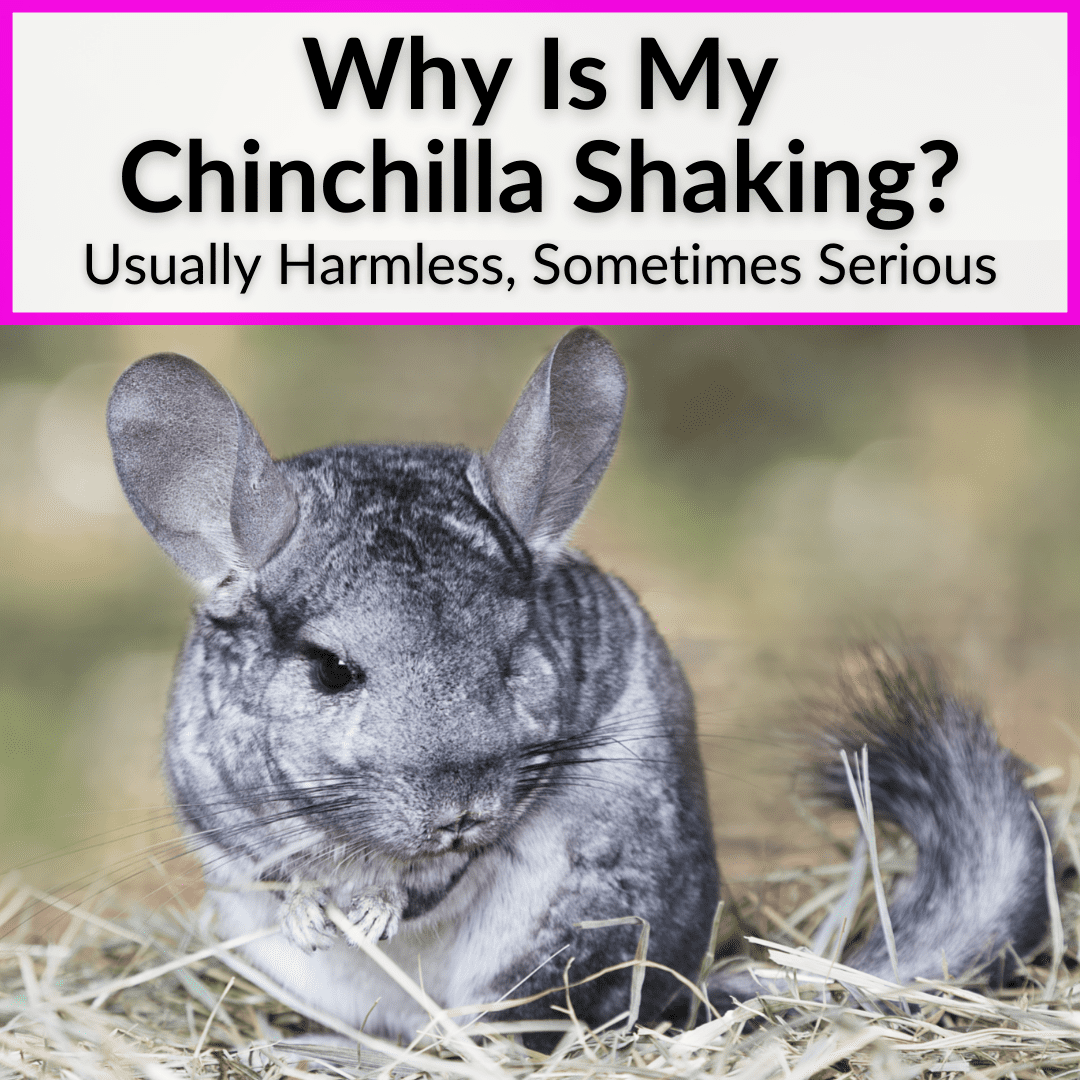
When you see your beloved chinchilla suddenly shake out of nowhere, it’s only natural to be concerned.
And you should be.
Before I worry you too much, let me say that most cases of a chinchilla shaking are completely harmless.
But there is also a chance it could be something serious.
So you do need to make sure it isn’t.
Keep reading to learn why chinchillas shake and how you can tell the difference between harmless shaking and something more serous.
Contents
Why Is My Chinchilla Shaking?
Chinchillas primarily shake due to fear. But you want to make sure your chinchilla isn’t exhibiting other odd behaviors that could indicate the shaking is due to an illness as opposed to fear.
It is important to understand that, while fear is the primary reason your chinchilla might shake, it is not the only reason.
Visually witnessing your chinchilla either shaking its head or full body can definitely leave you concerned and filled with anxiety.
Let’s take a look at some of the other possibilities, to ensure you are prepared to recognize them and handle your shaking chinchilla correctly.
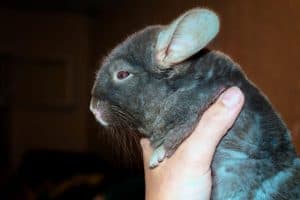
Be sure to check out my full digital eBook “voiding Critical Mistakes: Ultimate Chinchilla Care eBook” for the best advice, tips, and tricks and supply recommendations to make adopting and caring for a chinchilla much more comfortable and easier to understand.
You can learn more about this eBook offer using the link directly below.
Learn more here:👉 Avoiding Critical Mistakes: Ultimate Chinchilla Care eBook Offer
Why Do Chinchillas Shake: Potential Reasons
As mentioned above, one possible reason your chinchilla is shaking may be an illness. And it could be a serious illness, or one that could quickly progress to something serious.
That is why it is important to learn to distinguish the difference between your chinchilla being ill, scared, or just displaying some non-ordinary behavior.
You want to be sure your chinchilla isn’t shaking from something more than just fear. Because if it is an illness, you need to know so you can get it treated as quickly as possible.
But even if it is fear that is causing your chinchilla to sake, you are not out of the woods. Chinchillas are known to lose their fur or slip fur out of fear, causing bald spots.
Chinchillas can also panic when scared and escape from your grasp while you are holding them.
This makes it especially important to understand the proper technique to use when picking up your chinchilla so you always hold it in a fashion with which it is comfortable and that makes it feel safe.
In most cases, if your chinchilla is shaking due to illness, your chinchilla will also be lethargic and acting strangely in other ways. You may also notice a lack of appetite and your chin not drinking as much water as usual.
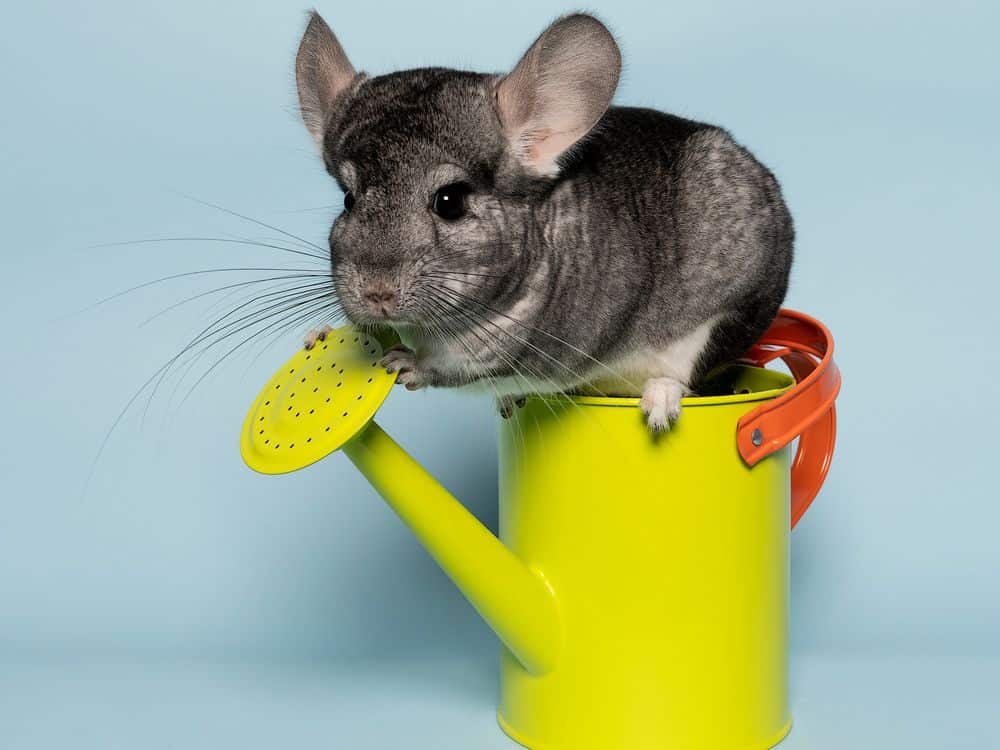
In chinchillas or any exotic pet, this is referred to as a “nonspecified illness.” In plain English, it could mean that your chinchilla is very sick.
Unfortunately, it’s going to be tough to distinguish which of the many diseases your chinchilla may have contracted, because a lot of them ca cause shaking. That is where a vet comes in.
Another possibility for chinchilla shaking could be the extremely rare, but still possible, scenario that your chinchilla has fleas.
Again, this is very rare and if it does happen, it’s likely because your chinchilla is around another pet that may have fleas. Interactions with dogs or cats are commonly at fault.
Health Concerns Shaking Could Indicate
I assume you are concerned at this point about what the potential illness may be that is causing your chinchilla to shake or lose his/her appetite.
Here’s a list of potential issues that your chinchilla may be experiencing.
- Liver disease
- Dental disease
- Heart disease
- Kidney disease
- Insulinoma
- Sepsis
- Intestinal disease
- Muscular disease
- Neurological disease
- Other possible diseases
Unfortunately, there isn’t a real way to figure out which one of these issues might be the reason for the shaking. You will have to see a veterinarian as soon as possible, if you suspect it is an illness causing the shaking, and not fear.
Make sure you keep your chinchilla comfortable during this time, by ensuring that he/she doesn’t get too cold or too hot.
To do this, ensure that you have a room where your chinchilla sleeps and is housed that you keep at ideal temperatures to avoid overheating and exacerbating any potential illness.
You also want to do your best to encourage your chinchilla to drink as much water as possible.
Lastly, if you have other pets in the household, make sure to keep your chinchilla away from them. During this lethargic period, your chinchilla may not only be shaking, but may also be too weak to run away or defend itself from your other household pets.
In these situations, be sure that you also monitor your chinchilla’s behavior and energy levels. Be careful with over handling your pet during these times as well, in case your chinchilla feels more prone to bite.
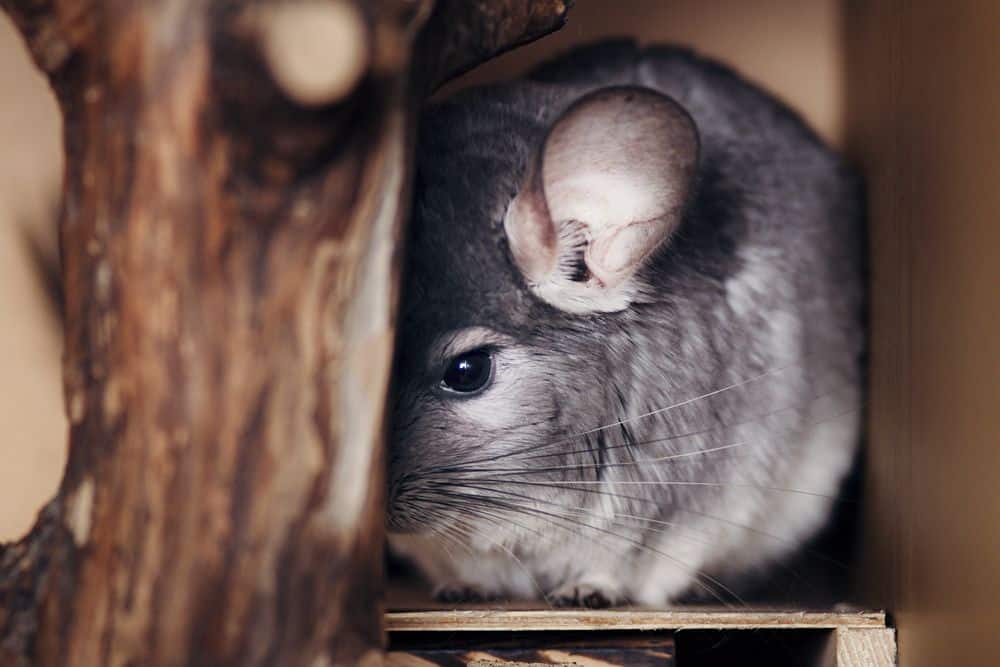
When chinchillas get sick or ill with an infection or disease, it tends to progress rapidly and if not caught or handled quickly, can result in death. Obviously, that is something every chinchilla owner wants to avoid at all costs.
Other Possible Reasons For Shaking
Some chinchilla owners have reported their chinchilla shaking for reasons other than the ones we have discussed so far. And luckily, these causes are a lot more harmless for your chinchilla.
In fact, they are downright positive, compared to the possibility of your chinchilla being sick. Let’s dive into a few more of the possibilities causing your chinchilla to shake, shiver or twitch.
Trying To Maintain Balance
Many chinchilla owners mention that their chinchilla will sometimes have shaking and quivering spells when they are out of the cage and in a playful and friendly mood.
Most of the owners who have experienced this mention that it’s most prevalent when your chinchilla is climbing on you, perhaps on your head, shoulders, or arms.
This is nothing to worry about and really nothing more than a nice cuddle session with your chinchilla.
When your chinchilla is resting on your head, shoulders, or arms you may experience this moment where your chinchilla appears to be shaking like crazy.
Owners report that they notice no-ongoing issues and it becomes a regular habit of the chinchilla when trying to sit still or relax in “chill mode” while balancing on you.
Picture your arm as the balancing beam and your chinchilla is simply trying to stay on without falling.
My chinchilla does this, too, at times. She climbs all over me and when she gets near the edge of my shoulder, she may shake trying to maintain her balance before she falls.
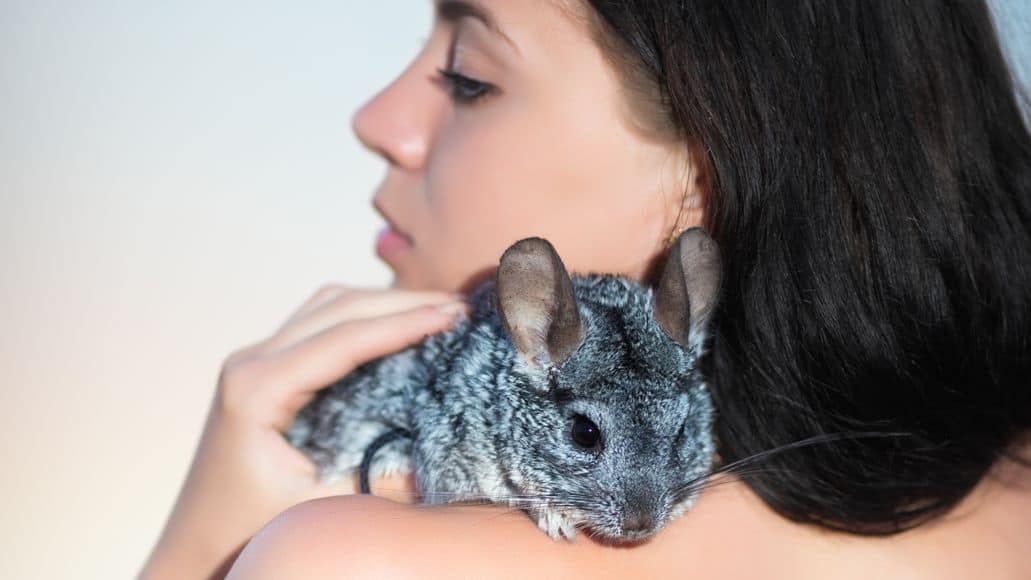
This is of course, usually right when she decides to poop in my lap or do something else that’s slightly rude but still humorous.
Chinchillas are just easy to care for. Chinchillas are also extremely enjoyable pets to own.
It’s tough to find many reasons to ever get frustrated with a chinchilla. Unless it comes time to scoop them up and place them back in their cage. That can be difficult to do for new owners.
If this is you, always remember to try the “base of the tail technique” to pick your chinchilla up and return it to its cage safely.
Shaking Can Indicate Love Or Enjoyment
Another possibility is that your chinchilla is expressing comfort by performing a slight shake. My chinchilla will shake when she is out and active. When she is close to me, she will even shake and “purr“, in a sense.
Many owners state that their chinchillas don’t seem fearful or attempt to run away and seem to be enjoying themselves when they are in this playful cuddling mood.
Shaking Can Indicate A Love Of Being Scratched
Finally, your chinchilla may be shaking simply because it loves being scratched.
Picture a dog for this scenario. When you scratch them in the right spot you get the wild shaking and leg kick.
This type of shaking isn’t an illness or fear. It’s pure joy and chinchilla heaven. If you scratch your chinchilla and get a shake in response, you may just be hitting the perfect spot that he or she enjoys.
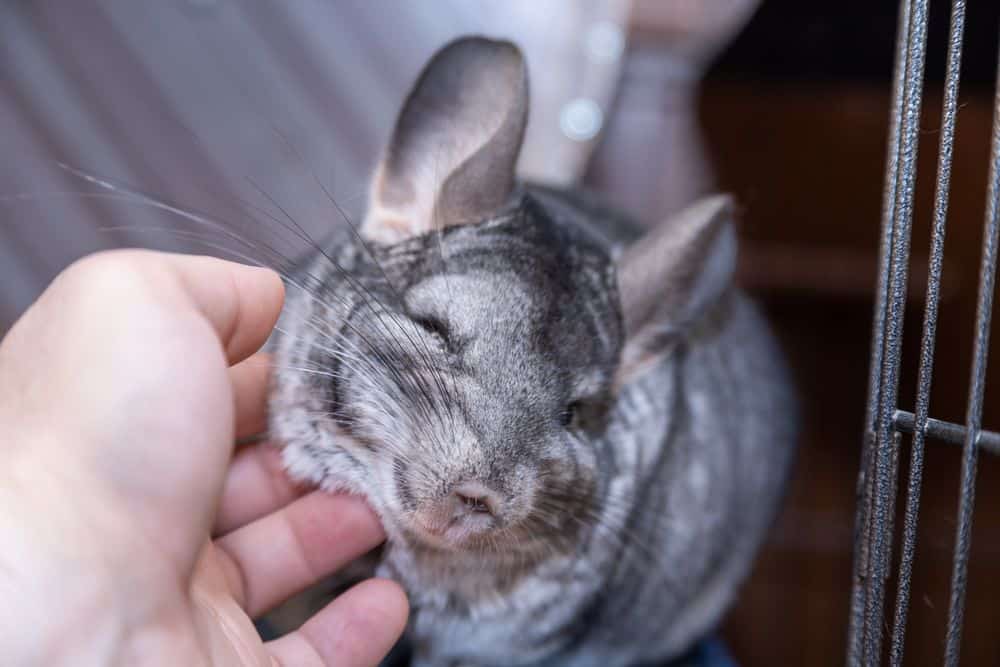
Lastly, always remember your chinchilla is fully capable of scratching itself as well.
If you walk in and notice your chinchilla shaking briefly, you could have walked in right after your chinchilla has just completed its own scratch session on itself. They commonly groom themselves and it is nothing to worry about.
Chinchilla Shaking: Final Thoughts
There are a variety of reasons as to why your chinchilla may be shaking.
Many of them are common and harmless. But it’s also possible that your chinchilla is shaking from something more serious.
In most circumstances, it’s nothing major to worry about. But you do need to make sure.
It’s always best to keep an eye on the shaking and make sure it’s not related to your chinchilla not feeling good or having an illness. Look out for other symptoms to determine if an illness may be the cause.
If you believe it is something that could be more serious, it’s important to contact your vet just to play it safe.
Share your thoughts about a chinchilla shaking.
Do you have any stories to share in relation to your chinchilla shaking?
Why was your chinchilla shaking and what did you do about it?
Be sure to share those thoughts, stories, and concerns by dropping a comment below.
As always, Chili and I appreciate you stopping by and reading today and we will see you again next time!
Chin-Fenpinscher says
My chinchilla Misty, is very friendly. I can pet her, and scratch her ears and chin and tummy. Getting her out of the cage, however, is a mission. Why is she so skittish when I try to pick her up?
Josh Martin says
that’s fantastic. Chinchilla’s are very friendly pets and this is always great to hear when other individuals have nothing but good stories to share about their chinchilla
star says
Most chinchilla hate being held. Try letting her get out of the cage by herself, that is what my chinchilla used to do.